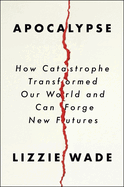
Written amid one of the world's worst pandemics in a century and published in the wake of catastrophic California wildfires, journalist Lizzie Wade's Apocalypse widens the lens to describe vividly how multiple societies have experienced massive upheavals and have emerged altered in sometimes unexpected ways. Combining extensive research and reporting with some speculative digressions, Wade travels from prehistoric Europe to the contemporary West for stories of extreme hardship and humankind's response.
Wade, a correspondent for Science, defines "apocalypse" as a "rapid, collective loss that fundamentally changes a society's way of life and sense of identity." It can be triggered by climate change, disease, and foreign invasion. In her view, "apocalypses are not endings. They are transformations." Among other epochal changes that Wade describes are those affecting a region known as Doggerland, once occupied by tribes of hunter-gatherers and now submerged below the North Sea; and the scourge of the Black Death that wiped out 30%-60% of the population of Europe and simultaneously laid the foundation for the Renaissance. She devotes considerable attention to the fall of the Aztec civilization and to the evidence of its existence that survives beneath the streets of modern Mexico City. It's only one of the admiring descriptions she offers of the work of contemporary archeologists, who are among the heroes of her story.
One comes away from Apocalypse with mingled feelings of empathy for all the suffering--self-inflicted and imposed from outside--that humanity has endured over the millennia and of admiration for the resilience we have shown in the face of it. Lizzie Wade has done an impressive job recounting some of these stories. ---Harvey Freedenberg, freelance reviewer

